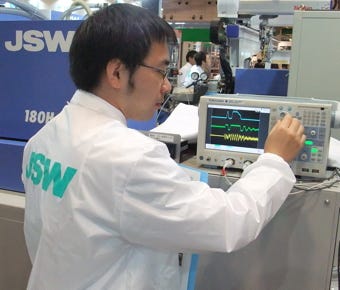Reduction of peak power in a processing shop can contribute to lower investment costs for transformers and other supply infrastructure as well as lower basic electricity charges in some countries. With this in mind, The Japan Steel Works (JSW, Tokyo) presented a prototype device at the recent IPF show in Japan that more than halved the peak energy requirement of a 1370-kN J140AD-180H machine operating on the show floor.
November 17, 2011
Reduction of peak power in a processing shop can contribute to lower investment costs for transformers and other supply infrastructure as well as lower basic electricity charges in some countries. With this in mind, The Japan Steel Works (JSW, Tokyo) presented a prototype device at the recent IPF show in Japan that more than halved the peak energy requirement of a 1370-kN J140AD-180H machine operating on the show floor.
|
Peak power reduction device cuts electricity requirement by more than 70%. |
The injection press was running on a 24-kW supply at 100 A rather than the 83 kW at 250 A normally required. The peak power reduction device employs capacitors to store power for use at times of peak requirement. Another advantage of the device is that in the event of a power outage, enough power is stored to operate for an additional complete cycle.
The injection machine operating at IPF also incorporated JSW's ABC (Automatic Best Clamping Force Control) technology for reducing clamping force that required. The machine builder has also been working on other improvements on the clamping end, including a tie bar temperature controller that balances tie bars by heating them, and its Clamping Precision Support System (CPSS) that improves clamping performance by eliminating the clearance in the mold thickness adjustment mechanism.-[email protected]
You May Also Like



